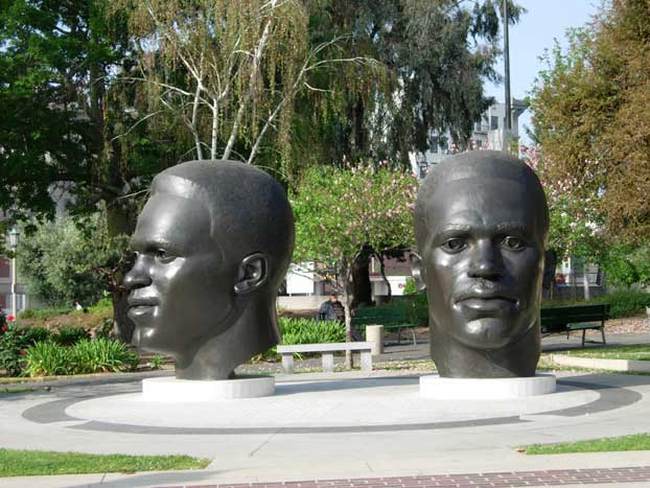Jackie Robinson is one of the most recognizable names in Black history. In fact, his name opened my last Black History Month article and it wasn’t even about him. Given America’s affection for sports, it is no wonder he is one of our most celebrated heroes.
As extraordinary as Robinson was, perhaps even more extraordinary is that he wasn’t the only exceptional athlete in his family, and he wasn’t the only one in his family to break barriers.
Matthew ‘Mack’ Robinson moved with his family from Georgia to Pasadena, California in the 1920s, where he eventually enrolled in Pasadena Junior College. There, Mack became a track-and-field sensation. He dominated in sprints and the long jump, and even set national junior college records in the 100m and 200m dashes and in the long jump.
Mack fought through financial hardship and medical complications from a heart issue to earn a spot on the 1936 Olympic Games in Berlin, hosted by Adolf Hitler and his Nazi regime. The elder Robinson brother traveled to Berlin as one of eighteen black athletes. He earned a silver medal for America in the 200 meters.
Mack beat the previous Olympic record. It was an incredible feat in and of itself. There was just one problem – the gold medal winner was Jesse Owens. Mack grew up in the shadow of not just one history-making athlete, but two.
It’s an unfortunate truth that history rarely remembers second place, but Mack Robinson deserves to be an exception. He was a world-class athlete who had the good/bad luck to grow up in proximity to some of the best athletes who ever lived. Had there been no Jesse Owens that Olympic year, Robinson would have owned that goal, and it would be his name we celebrate when speaking of those games and Black history.
‘It’s not too bad to be second best in the world at what you’re doing, no matter what it is,” he said of his Olympic silver medal. ”It means that only one other person in the world was better than you. That makes you better than an awful lot of people.”
Mack is said to have always resented the shadow his brother Jackie cast over his ambitions, although he worked tirelessly to cement Jackie’s place in history after the death of the baseball pioneer. Even though Mack went on to set a school record in the 220-yard hurdles at the University of Oregon in 1941, he never really did receive the recognition he deserved for his historic athleticism. He still faced the crippling racism of his time, struggling to secure employment in his hometown of Pasadena. Eventually he found work as street sweeper for the city of Pasadena. Sadly, he was fired by the city in retaliation after a judge ordered all public pools desegregated.
”If anybody in Pasadena was proud for me, other than my family and close friends,” he said, ”they never showed it. I was totally ignored. The only time I was noticed was when somebody asked me during an assembly at school if I’d race against a horse.”
In 1984, Mack was selected to help carry the Olympic flag into the Los Angeles Memorial Coliseum during the opening ceremonies of the Summer Olympics.
The city of Pasadena eventually erected a bronze statue to pay tribute to the ground-breaking brothers.

Mack Robinson passed away in a Pasadena hospital in 2000 at the age of 87. During his life he did not get the celebration he deserved as a barrier-breaking, record-setting athlete in his own right. That is unfortunate, but it’s never too late to recognize the impact of special men in history.
Mack Robinson overcame the impossible odds of racism and poverty to literally stare evil right in his face. He stood as part of the bravest team in Olympic history, and brought priceless treasure home to a country that still hadn’t figured out how celebrate men like him.
Here’s to Mack Robinson, a great American and one who deserves to be celebrated as a game-changer.
Below is part one of a two-part interview with Mack Robinson recorded at an unknown time.













Join the conversation as a VIP Member